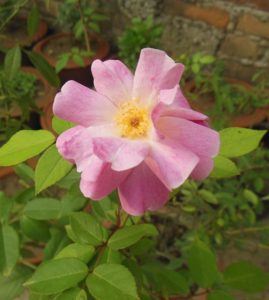Rosa rubiginosa (sweet briar, sweetbriar rose, sweet brier or eglantine; R. eglanteria) is a species of rose native to Europe and western Asia.
Contents
Uses
The tea made from the hips of this rose is very popular in Europe and elsewhere, where it is considered a healthy way for people to get their daily dose of vitamin C and other nutrients. A cup of rose hip tea will provide the minimum daily adult requirement of vitamin C. During World War II the British relied on rose hips and hops as the sources for their vitamins A and C. It was a common British wartime expression to say that: “We are getting by on our hips and hops.”
In Tunisia, natural flower water is produced from its flowers.
In Chile, Spain and Argentina, where it is known as “Rosa Mosqueta”, it can be found in the wild around the Andes range and is also cultivated to produce marmalades and cosmetic products.
Benefits
Rosa Rubiginosa Seed Oil is extracted from the seeds of a rose bush found in the southern Andes of Argentina and Chile, and is used for its Vitamin A (Retinol) and Vitamin C content, as well as its antioxidant, diuretic (which reduces puffiness) and astringent properties. Its seed is also used as a finely ground power that serves as a natural exfoliant; it provides gentle removal of dead skin cells, without causing any injury to the skin, as it has no sharp edges (Wikipedia and Dermaxime.com).
According to EssentialBotanicals.com, Rosa Rubiginosa Seed Oil is considered an anti-aging ingredient because of its high Vitamin C content and its ability to boost skin regeneration and elasticity. It is also high in GLA, an essential fatty acid which helps to reduce fine lines and combat the drying effects of the sun, environment and climate. Other fatty acids found in high levels in Rosa Rubiginosa Seed Oil include Linoleic Acid (47.4%) and Linolenic Acid (33%), which help healing and regeneration, while preventing the formation of thick keloid scar tissue and are helpful in healing burns, scars and stretch marks.
A study found that daily applications of Rosa Rubiginosa Seed Oil facilitated wrinkle reduction, and the fading of age spots and sun damage. Twenty women between 25 and 35 years of age applied a formula containing this ingredient over a four-month period, and all reported a visible improvement to the skin, according to Dermaxime.com.
It penetrates the skin easily and is considered a powerful moisturizer and emollient, and is used for a variety of skin conditions, including dermatitis, acne and eczema, for mature and sun burnt skin as well as brittle nails and wrinkles. It also includes other beneficial compounds such as tannins, citric acid, essential oil, epicatechin, flavonoids, gallocatechin, invert sugars, isoquercitrin, leucoanthocyanins, lycopene, magnesium, malic acid, pectin, protein, rubidium, rubixanthin, succinic acid, sucrose, and alpha-tocopherol (vitamin E)
Cautions
The Cosmetics Database finds Rosa Rubiginosa Seed Oil to be a 100% safe ingredient, and no other studies were found that reported any adverse side effects after using formulas containing this ingredient. Although Vitamin C can be considered irritating, Rosa Rubiginosa Seed Oil is found to be non-irritating to the skin because it naturally “prevents the ‘Fenton reaction,’ which is a normal reaction that water-soluble vitamin C has when interacting with the iron in the skin. A hydroxyl free radical forms in this action – which does not happen when the vitamin C in rosehip oil interacts with the skin” (Dermaxime.com).
Interactions
None are recorded.
Other names
sweet briar, sweetbriar rose, sweet brier or eglantin
References
Wikipedia, https://en.wikipedia.org/wiki/Rosa_rubiginosa#Cultivation_and_uses
Truth in Aging, https://en.wikipedia.org/wiki/Rosa_rubiginosa#Cultivation_and_uses

